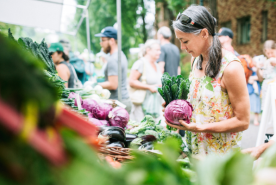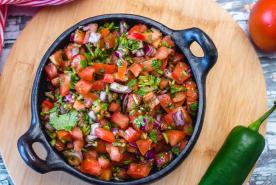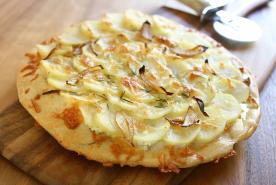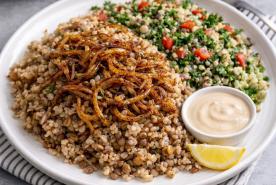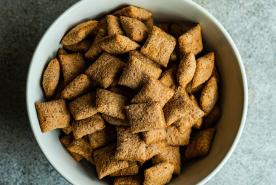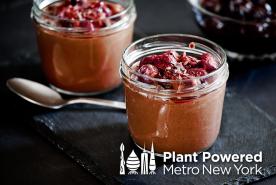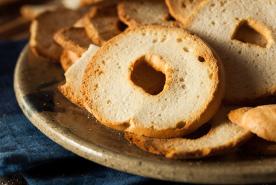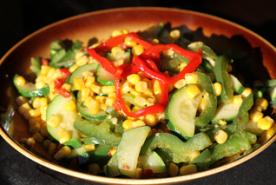Nuts and seeds come in many types. Though they are high in oil, they offer "good fats"
Table of Contents
- Why are nuts and seeds superfoods?
- Nuts and seeds and kidney disease
- Kidney disease and transplant recipients
- Hemodialysis (3 times a week)
- Daily home and nocturnal hemodialysis and peritoneal dialysis
- Kidney stones
- Nuts and seeds facts
- Recipe
- Want to save this information for later?
- For more information, contact the National Kidney Foundation
Nuts and seeds come in many varieties. Although most nuts and seeds have a high oil content, they provide “good fats” such as monounsaturated and polyunsaturated fats.
Why are nuts and seeds superfoods?
Nuts and seeds contain many beneficial elements such as heart-healthy fats, omega 3s, plant sterols, fiber, plant protein, vitamin E, selenium, and calcium. They also help prevent inflammation and are rich in antioxidants.
- Nuts can help suppress hunger because of their protein, fat, and fiber content.
- Crushed nuts add texture and flavor to foods.
- You can enjoy nuts and seeds as a snack (handful), sprinkle on top of salads or cereal, and add to smoothies or trail mix.
Kidney disease and transplant recipients
Most people with CKD or a kidney transplant do not have to limit nuts and seeds due to potassium or phosphorus. If your laboratory results show higher levels of potassium, a kidney dietitian may talk with you about how much to eat. Find a kidney dietitian.
Hemodialysis (3 times a week)
Potassium and phosphorus can be a concern for nuts and seeds. Limit to ¼ cup portion. Use the chart on the next page to choose nuts and seeds that will fit your kidney diet plan. For example, macadamia nuts and pecans are lower in potassium and phosphorus than peanuts and almonds
Daily home and nocturnal hemodialysis and peritoneal dialysis
These types of dialysis can remove more potassium, so you may need to eat more potassium foods. The amount of phosphorus you may have will depend on your blood phosphorus level. Use the chart on the next page to choose nuts and seeds that will fit your kidney diet plan.
Nuts and seeds facts
| Nuts and seeds (1/4 cup) | Phosphorus (mg) | Potassium (mg) | Protein (g) |
|---|---|---|---|
| Roasted pumpkin seeds | 15 | 147 | 3 |
| Macadamia nuts | 63 | 124 | 2.7 |
| Pecan halves | 69 | 101 | 2.3 |
| Hazelnuts | 84 | 196 | 4.3 |
| Sunflower seeds | 100 | 80 | 1.7 |
| English walnuts | 101 | 129 | 4.5 |
| Peanuts | 133 | 232 | 8.9 |
| Cashews | 150 | 180 | 5 |
| Almonds | 150 | 200 | 6 |
| Pistachios | 150 | 290 | 6 |
| Black walnuts | 154 | 157 | 7 |
| Pine nuts | 194 | 202 | 4.6 |
| Nut butters (2 tablespoons) | Phosphorus (mg) | Potassium (mg) | Protein (g) |
|---|---|---|---|
Almond butter | 163 | 240 | 6.7 |
| Peanut butter | 108 | 180 | 7.2 |
| Sunflower seed butter | 214 | 184 | 5.5 |
Recipe
Green beans, hazelnuts, and dried cranberries
Makes 8 servings
Ingredients
- 1½ pounds fresh (or frozen) green beans
- ½ cup hazelnuts
- 12 cups water
- 3 tablespoons olive oil
- ⅓ cup shallots, thinly sliced
- ½ cup dried cranberries
- ½ teaspoon lemon zest
Instructions
- Preheat oven to 350 degrees.
- Spread hazelnuts in a single layer on a baking sheet. Bake at 350 degrees for 10-15 minutes or until the skins begin to split, turn once.
- Transfer toasted nuts to a colander or dish and rub briskly with a towel to remove the skins. Coarsely chop nuts.
- Bring 12 cups of water to a boil in a large saucepan. Add beans, cook 4 minutes or until crisp-tender. Drain and plunge into ice water, drain. Pat beans dry.
- Heat a large skillet over medium heat. Add oil to pan, swirl to coat. Add shallots, cook until lightly browned. Add beans, cook 3 minutes or until thoroughly heated, stirring occasionally. Add cranberries and hazelnuts, cook 1 minute. Sprinkle with lemon zest.
Nutritional facts per serving
| Calories | 199 |
| Carbohydrates | 17 g |
| Protein | 4 g |
| Fat | 14 g |
| Sodium | 19 mg |
| Potassium | 246 mg |
| Phosphorus | 73 mg |






